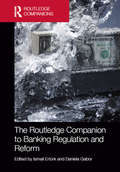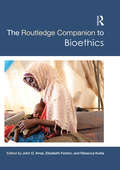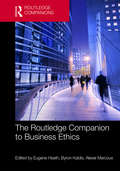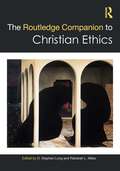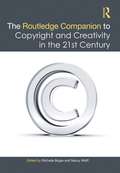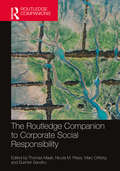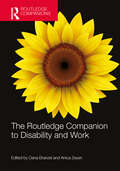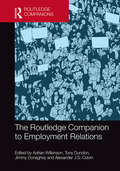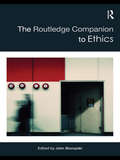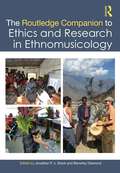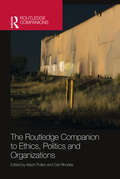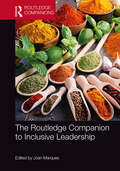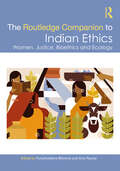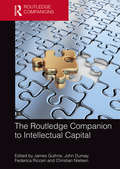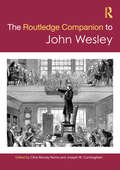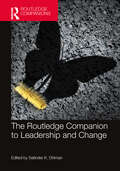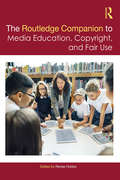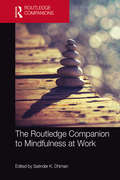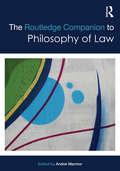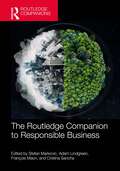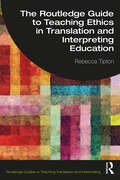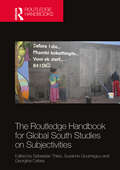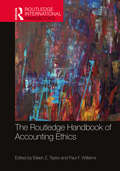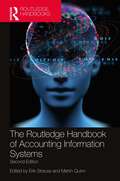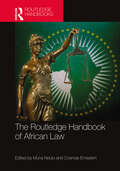- Table View
- List View
The Routledge Companion to Banking Regulation and Reform (Routledge Companions in Business, Management and Accounting)
by Daniela Gabor Ismail ErtürkThe Routledge Companion to Banking Regulation and Reform provides a prestigious cutting edge international reference work offering students, researchers and policy makers a comprehensive guide to the paradigm shift in banking studies since the historic financial crisis in 2007. The transformation in banking over the last two decades has not been authoritatively and critically analysed by the mainstream academic literature. This unique collection brings together a multi-disciplinary group of leading authorities in the field to analyse and investigate post-crisis regulation and reform. Representing the wide spectrum of non-mainstream economics and finance, topics range widely from financial innovation to misconduct in banking, varieties of Eurozone banking to reforming dysfunctional global banking as well as topical issues such as off-shore financial centres, Libor fixing, corporate governance and the Dodd-Frank Act. Bringing together an authoritative range of international experts and perspectives, this invaluable body of heterodox research work provides a comprehensive compendium for researchers and academics of banking and finance as well as regulators and policy makers concerned with the global impact of financial institutions.
The Routledge Companion to Bioethics (Routledge Philosophy Companions)
by John D. Arras Elizabeth Fenton Rebecca KuklaThe Routledge Companion to Bioethics is a comprehensive reference guide to a wide range of contemporary concerns in bioethics. The volume orients the reader in a changing landscape shaped by globalization, health disparities, and rapidly advancing technologies. Bioethics has begun a turn toward a systematic concern with social justice, population health, and public policy. While also covering more traditional topics, this volume fully captures this recent shift and foreshadows the resulting developments in bioethics. It highlights emerging issues such as climate change, transgender, and medical tourism, and re-examines enduring topics, such as autonomy, end-of-life care, and resource allocation.
The Routledge Companion to Business Ethics (Routledge Companions in Business, Management and Accounting)
by Byron Kaldis Eugene Heath Alexei MarcouxThe field of business ethics continues to expand intellectually and geographically. During the past five decades, scholars have developed and deepened their inquiries into the ethics of commercial and corporate conduct. This Companion provides a novel overview of the discipline of business ethics, covering the major areas of the field as well as new and emerging topics. The eight thematic units range over an extraordinary set of subjects and include chapters on the history and pedagogy of business ethics, moral philosophy, the nature of business, responsibilities within the firm, economic institutions, the 2008 financial crisis, globalization, and business ethics in different regions of the world. Led by a well-respected editorial team, this unique volume gathers an international array of experts whose various critical approaches yield insights from areas such as public policy, economics, law, and history, in addition to business and philosophy. With its fresh analyses, wide scope, and clarity of approach, this volume will be an essential addition to library collections in business, management, and applied ethics.
The Routledge Companion to Christian Ethics (Routledge Religion Companions)
by D. Stephen Long Rebekah L. MilesThe Routledge Companion to Christian Ethics brings together two different but related disciplines; the first is contemplative or theoretical, asking what are the beliefs or doctrines that characterize Christianity, whilst the second is practical, asking what are the ethical practices that attend its teachings. The movement between the theoretical and practical aspects is not, however, one way, as doctrine and life are mutually informing. In this comprehensive volume, leading scholars address key topics, problems and debates in this hotly debated topic within a truly global context. Comprising over 35 chapters by a team of international contributors, the handbook is divided into three parts based on the three persons of the Trinity: God the Father, God the Son, and God the Holy Spirit. Within these sections, cutting-edge issues are examined, including: God and genetics War, peace, and violence White supremacy Creation and sexuality Digital ethics Transgender studies Climate change Immigration and refugees Adopting a practical approach that must consider new concerns that have arisen with recent social, political, and cultural shifts, The Routledge Companion to Christian Ethics is essential reading for students and researchers in Christian ethics, religious ethics and Christianity studies. The handbook will also be very useful for those in related fields such as ethics and philosophy.
The Routledge Companion to Copyright and Creativity in the 21st Century
by Michelle Bogre and Nancy WolffThese collected chapters and interviews explore the current issues and debates about how copyright will or should adapt to meet the practices of 21st-century creators and internet users. The book begins with an overview of copyright law basics. It is organized by parts that correspond to creative genres: Literary Works, Visual Arts, Fine Art, Music, Video Games and Virtual Worlds, Fashion, and Technology. The chapters and interviews address issues such as copyright ownership in work created by Artificial Intelligence (AI), the musical remix market, whether appropriation is ever a fair use of a copyrighted work or if it is always theft, and whether internet- based platforms should do more to deter piracy of creators’ works. Each part ends with an essay explaining the significance of one or two landmark or trendsetting cases to help the reader understand the practical implications of the law. Written to be accessible to both lay and legal audiences, this unique collection addresses contemporary legal issues that all creators need to understand and will be essential reading for artists, designers, and musicians as well as the lawyers who represent them.
The Routledge Companion to Corporate Social Responsibility (Routledge Companions in Business, Management and Marketing)
by Thomas Maak, Nicola M. Pless, Marc Orlitzky, and Sukhbir SandhuWhile the concept and domain of Corporate Social Responsibility (CSR) are not new—its beginnings can be tracked back to the 1960s—its scope, urgency, and relevance have shifted dramatically in recent years. CEO responses show that the majority of business leaders understand that they operate in an environment of contested values and that stakeholders expect companies to do better and more. However, many corporate incentive systems are not in sync with societal norms and expectations. Moreover, "grand challenges" such as climate change and global pandemics and growing interconnectedness shed light on the fault lines of value creation through complex supply chain systems, exposing unacceptable working conditions, modern slavery, and the environmental consequences of highly distributed production at any cost. As a consequence, corporate social responsibility has become a widely accepted common denominator of the role and responsibilities of business in society, ranging from core functions such as health, safety, and environment standards, to governance and recognition of stakeholders, supply chain design, and corporations’ stand on climate change and its responsibility to future generations. This volume assembles state-of-the-art scholarship from leading scholars in the field and enables a "full range view" of CSR, from its roots, normative foundations, and institutional perspectives to matters of stakeholding, the global value chain, social innovation, and future directions. The Routledge Companion to Corporate Social Responsibility represents a prestige reference work providing an overview of the subject area of CSR for academics, researchers, postgraduate students, as well as reflective practitioners.
The Routledge Companion to Disability and Work (Routledge Companions in Business, Management and Marketing)
by Oana Branzei Anica ZeyenThe Routledge Companion to Disability and Work explores the realities faced by disabled individuals in the workplace and beyond. Despite enduring stereotypes and prejudice, disabled employees and entrepreneurs continue to achieve and thrive. This Companion documents the history and future of disability organizing, highlighting concerns of the world's largest minority—over 1 billion people or 15% of the global population. Inspired by the sunflower symbol for invisible disabilities, this Companion sheds light on the unseen efforts undertaken by disabled people to combat ableism. It delves into stories of employment, entrepreneurship, self-advocacy, activism, and well-being management. Highlighting how disabled workers mobilize support, fight for human rights, respect, and equality, navigate the challenges of disclosure and intersectionality, build networks, and foster inclusive environments, it underscores the contributions of disabled individuals and their allies. Authored by experts, many with personal experiences of disability, this Companion showcases the diverse types of work disabled people—and their allies—perform that go beyond the duties of their job roles. It provides a robust foundation for understanding and advancing disability inclusion. With global research, the Companion broadens our understanding of the (in)visible challenges and triumphs of disabled people at work. Celebrating disability pride and joy, it offers insights into navigating biases, stigma, and discrimination. The disability movement, fueled by inequities in healthcare, education, accessibility, and work, deserves attention from business leaders. This comprehensive guide is essential for students, teachers, and researchers looking to intersect disability and business, paving the way for a more inclusive and equitable future.
The Routledge Companion to Employment Relations (Routledge Companions in Business, Management and Accounting)
by Adrian Wilkinson Tony Dundon Jimmy Donaghey Alexander ColvinComprising five thematic sections, this volume provides a critical, international and interdisciplinary exploration of employment relations. It examines the major subjects and emerging areas within the field, including essays on institutional theory, voice, new actors, precarious work and employment. Led by a well-respected team of editors, the contributors examine current knowledge and debates within each topic, offering cutting-edge analysis and reflection. The Routledge Companion to Employment Relations is an extensive reference work that offers students and researchers an introduction to current scholarship in the longstanding discipline of employment relations. It will be an essential addition to library collections in business and management, law, economics, sociology and political economy.
The Routledge Companion to Ethics (Routledge Philosophy Companions)
by John SkorupskiThe Routledge Companion to Ethics is an outstanding survey of the whole field of ethics by a distinguished international team of contributors. Over 60 chapters are divided into six clear sections: the history of ethics meta-ethics perspectives from outside ethics ethical perspectives morality debates in ethics. The Companion opens with a comprehensive historical overview of ethics, including chapters on Plato, Aristotle, Hume, and Kant, and ethical thinking in China, India and the Arabic tradition. The second part covers the domain of meta-ethics. The third part covers important challenges to ethics from the fields of anthropology, psychology, sociobiology and economics. The fourth and fifth sections cover competing theories of ethics and the nature of morality respectively, with entries on consequentialism, Kantian morality, virtue ethics, relativism, evil, and responsibility amongst many others. A comprehensive final section includes the most important topics and controversies in applied ethics, such as rights, justice and distribution, the end of life, the environment, poverty, war and terrorism. The Routledge Companion to Ethics is a superb resource for anyone interested in the subject, whether in philosophy or related disciplines such as politics, education, or law. Fully indexed and cross-referenced, with helpful further reading sections at the end of each chapter, it is ideal for those coming to the field of ethics for the first time as well as readers already familiar with the subject.
The Routledge Companion to Ethics and Research in Ethnomusicology (Routledge Music Companions)
by Beverley Diamond Jonathan P. J. StockThe Routledge Companion to Ethics and Research in Ethnomusicology is an in-depth survey of the moral challenges and imperatives of conducting research on people making music. It focuses on fundamental and compelling ethical questions that have challenged and shaped both the history of this discipline and its current practices. In 26 representative cases from across a broad spectrum of geographical, societal, and musical environments, authors collectively reflect on the impacts of ethnomusicological research, exploring the ways our work may instantiate privilege or risk bringing harm, as well as the means that are available to provide recognition, benefit, and reciprocation to the musicians and others who contribute to our studies. In a world where differing ethical values are often in conflict, and where music itself is meanwhile a powerful tool in projecting moral claims, we aim to uncover the conditions and consequences of the ethical choices we face as ethnomusicologists, thereby contributing to building a more engaged, restructured discipline and a more globally responsible music studies. The volume comprises four parts: (1) sound practices and philosophies of ethics; (2) fieldwork encounters; (3) environment, trauma, collaboration; and (4) research in public domains.
The Routledge Companion to Ethics, Politics and Organizations (Routledge Companions in Business, Management and Accounting)
by Alison Pullen Carl RhodesThe Routledge Companion to Ethics, Politics and Organizations synthesizes and extends existing research on ethics in organizations by explicitly focusing on ‘ethico-politics’ - where ethics informs political action. It draws connections between ethics and politics in and around organizations and the workplace, examines cutting-edge areas and sets the scene for future research. Through a wealth of international and multidisciplinary contributions this volume considers the broad range of ways in which ethics and politics can be conceived and understood. The chapters look at various ethical traditions, as well as the discursive deployment of ethical terminology in organizational settings, and they also examine large scale political structures and processes and how they relate to different forms of politics which affect behaviour in organizations. These many possibilities are united by a focus on how ethics can be used to inform and justify the exercise of power in organizations. This collection will be a valuable reference source for students and researchers across the disciplines of organizational studies, ethics and politics.
The Routledge Companion to Inclusive Leadership (Routledge Companions in Business, Management and Accounting)
by Joan MarquesAn important reference work on a practice that is needed more than ever in a VUCA world, this book helps readers understand the importance of responsible and constructive practices and behavior in leadership. The broad approach to inclusive leadership presented in this volume highlights correlations between inclusive leadership and myriad issues, qualities, and circumstances that serve as foundations or impact factors on it. Some contributors review contemporary concepts and challenges such as change, innovation, the bottom line, sustainability, and performance excellence against inclusive leadership. Other contributors reflect on critical practices and qualities, such as trust, passion, ethics, spirituality, and empathy, and their relationships with inclusive leadership. A range of religious and spiritual influences are also evaluated in the context of inclusive leadership, such as (but not limited to) Buddhism, Taoism, Hinduism, Jainism, and Christianity. Postgraduate students, instructors, and coaches will appreciate this comprehensive look at inclusive leadership, which has become an urgent concept to be internalized and practiced by all, regardless of positions, possessions, locations, or generations.
The Routledge Companion to Indian Ethics: Women, Justice, Bioethics and Ecology
by Purushottama Bilimoria Amy RaynerThis companion volume focuses on the application and practical ramifications of Indian ethics. Here Indian dharma ethics is moved from its preeminent religious origins and classical metaethical proclivity to, what Kant would call, practical reason – or in Aristotle’s poignant terms, ēhikos and phronēis –and in more modern parlance normative ethics. Our study examines a wide range of social and normative challenges facing people in such diverse areas as women’s rights, infant ethics, politics, law, justice, bioethics and ecology. As a contemporary volume, it builds linkages between existing theories and emerging moral issues, problems and questions in today’s India in the global arena. The volume brings together contributions from some 40 philosophers and contemporary thinkers on practical ethics, exploring both the scope and boundaries or limits of ethics as applied to everyday and real-life concerns and socio-economic challenges facing India in the context of a troubled globalizing world. As such, this collection draws on multiple forms of writing and research, including narrative ethics, interviews, critical case studies and textual analyses.The book will be of interest to scholars, researchers and students of Indian philosophy, Indian ethics, women and infant issues, social justice, environmental ethics, bioethics, animal ethics and cross-cultural responses to dominant Western moral thought. It will also be useful to researchers working on the intersection of Gandhi, sustainability, ecology, theology, feminism, comparative philosophy and dharma studies.
The Routledge Companion to Intellectual Capital (Routledge Companions in Business, Management and Accounting)
by James Guthrie John Dumay Federica Ricceri Christian NielsenThe Routledge Companion to Intellectual Capital offers a comprehensive overview of an important field that has seen a diverse range of developments in research in recent years. Edited by leading scholars and with contributions from top academics and practitioners from around the world, this volume will provide not just theoretical analysis but also evaluate practice through case studies. Combining theoretical and practice perspectives, this comprehensive Companion addresses the role of IC inside and between organisations and institutions and how these contribute to the IC of nations, regions and clusters. Drawing on an extensive range of leading contributors,The Routledge Companion to Intellectual Capital will be of interest to scholars who want to understand IC from a variety of perspectives, as well as students who are seeking an authoritative and comprehensive source on IC and knowledge management.
The Routledge Companion to John Wesley (Routledge Religion Companions)
by Joseph W. Cunningham Clive Murray NorrisThe Routledge Companion to John Wesley provides an overview of the work and ideas of one of the principal founders of Methodism, John Wesley (1703-91). Wesley remains highly influential, especially within the worldwide Methodist movement of some eighty million people. As a preacher and religious reformer his efforts led to the rise of a global Protestant movement, but the wide-ranging topics addressed in his writings also suggest a mind steeped in the intellectual developments of the North Atlantic, early modern world. His numerous publications cover not only theology but ethics, history, aesthetics, politics, human rights, health and wellbeing, cosmology and ecology. This volume places Wesley within his eighteenth-century context, analyzes his contribution to thought across his multiple interests, and assesses his continuing relevance today. It contains essays by an international team of scholars, drawn from within the Methodist tradition and beyond. This is a valuable reference particularly for scholars of Methodist Studies, theology, church history and religious history.
The Routledge Companion to Leadership and Change (Routledge Companions in Business and Management)
by Satinder K. DhimanThe unique leadership challenges organizations face throughout the world call for a renewed focus on what constitutes "authentic, inclusive, servant, transformational, principled, values-based, and mindful" leadership. Traditional approaches rarely provide a permeating or systematic framework to garner a sense of higher purpose or nurture deeper moral and spiritual dimensions of leaders. Learning to be an effective leader requires a deep personal transformation, which is not easy. This text provides guidelines in a variety of settings and contexts while presenting best practices in successfully leading the twenty-first century workforce and offering strategies and tools to lead change effectively in the present-day boundary-less work environment. Given the ever-growing, widespread importance of leadership and its role in initiating change, this will be a key reference work in the field of leadership and change management in business. The uniqueness of this book lies in its anchorage in the moral and spiritual dimension of leadership, an approach most relevant for contemporary times and organizations. It represents an important milestone in the perennial quest for discovering the best leadership models and change practices to suit the contemporary organizations. Designed to be a resource for scholars, practitioners, teachers and students seeking guidance in the art and science of leadership and change management, this will be an invaluable reference for libraries with collections in business, management, sports, history, politics, law, and psychology. It will present essential strategies for leading and transforming corporations, small businesses, schools, hospitals, and various nonprofit organizations. It brings the research on leadership and change management up to date, while mapping its terrain and extending the scope and boundaries of this field in an inclusive and egalitarian manner.
The Routledge Companion to Media Education, Copyright, and Fair Use (Routledge Media and Cultural Studies Companions)
by Renee HobbsMedia literacy educators rely on the ability to make use of copyrighted materials from mass media, digital media and popular culture for both analysis and production activities. Whether they work in higher education, elementary and secondary schools, or in informal learning settings in libraries, community and non-profit organizations, educators know that the practice of media literacy depends on a robust interpretation of copyright and fair use. With chapters written by leading scholars and practitioners from the fields of media studies, education, writing and rhetoric, law and society, library and information studies, and the digital humanities, this companion provides a scholarly and professional context for understanding the ways in which new conceptualizations of copyright and fair use are shaping the pedagogical practices of media literacy.
The Routledge Companion to Mindfulness at Work
by Satinder K. DhimanGiven the ever-growing interest in the benefits of mindfulness to organizations and the individuals who work in them, this Companion is a comprehensive primary reference work for mindfulness (including creativity and flow) in the workplace, including business, healthcare, and educational settings. Research shows that mindfulness boosts creativity through greater insight, receptivity, and balance, and increases energy and a sense of wellbeing. This Companion traces the genesis and growth of this burgeoning field, tracks its application to the workplace, and suggests trends and future directions. With contributions from leading scholars and practitioners in business, leadership, psychology, healthcare, education, and other related fields, The Routledge Companion to Mindfulness at Work is an extensive reference work which will be a vital resource to the fields of management and organizational studies, human resource management, psychology, spirituality, cultural anthropology, and sociology. Each chapter will present a listing of key topics, a case or situation that illustrates the application of the themes, workplace lessons, and reflection questions.
The Routledge Companion to Philosophy of Law (Routledge Philosophy Companions)
by Andrei MarmorThe Routledge Companion to the Philosophy of Law provides a comprehensive, non-technical philosophical treatment of the fundamental questions about the nature of law. Its coverage includes law’s relation to morality and the moral obligations to obey the law, the main philosophical debates about particular legal areas such as criminal responsibility, property, contracts, family law, law and justice in the international domain, legal paternalism and the rule of law. The entirely new content has been written specifically for newcomers to the field, making the volume particularly useful for undergraduate and graduate courses in philosophy of law and related areas. All 39 chapters, written by the world’s leading researchers and edited by an internationally distinguished scholar, bring a focused, philosophical perspective to their subjects. The Routledge Companion to the Philosophy of Law promises to be a valuable and much consulted student resource for many years.
The Routledge Companion to Responsible Business (Routledge Companions in Business, Management and Marketing)
by Adam Lindgreen François Maon Stefan Markovic Cristina SanchaContemporary companies are expected to behave ethically and responsibly toward their stakeholders and to provide social and environmental good. Key stakeholder groups, including employees, consumers, investors, and public authorities, increasingly demand that companies deliver products and services in responsible yet economically sound manners and act in accordance with moral obligations and financial requirements. Such mounting societal expectations and institutional pressures relate to complex concerns, including environmental and climate impact, working conditions, and human rights, both locally and oversees. In this context, as companies now appear to commit to comprehensively tackle ethical, social, environmental, and economic challenges, concerns increasingly are raised as to whether most companies in the end can indeed contribute to societal and environmental good and transform how they operate to create value responsibly, considering the success and impact of so called corporate social responsibility or sustainability policies.In recent decades, while some companies have advanced on their social and environmental responsibility journey, other companies have engaged in ethical, social, and environmental initiatives in manipulative and insincere way, or merely as a rhetorical tool to maintain legitimacy. Together with governments and business partners, these companies are largely failing to deliver for society and the environment. Subsequently, more than ever before, understanding what it means to do business responsibly and how business actors can engage constructively in ways that support the development of resilient business practices, forms, and organizations that contribute to generate positive impact for society and the environment and generate the type of economic value needed to address the key challenges of this century is central.On this background, this edited volume sheds light on different crucial themes and approaches spanning historical, conceptual, operational, critical, practical, and prospective considerations that have animated the field of business and society in the last decades, and that are instrumental or have the potential to drive constructive research discussions and business efforts.The central aim of the book is to set the research agenda for the next five to seven years, to redefine existing areas within the context of international research, and to highlight emerging research areas in need of further investigation, representing a prestige reference work providing an overview of the subject area of responsible business, primarily for academics, researchers, postgraduate students, as well as reflective practitioners.
The Routledge Guide to Teaching Ethics in Translation and Interpreting Education (Routledge Guides to Teaching Translation and Interpreting)
by Rebecca TiptonRoutledge Guides to Teaching Translation and Interpreting is a series of practical guides to key areas of translation and interpreting for instructors, lecturers, and course designers. This book provides university-level educators in translation and interpreting with a practical set of resources to support a pedagogically engaged approach to ethics. Encompassing critical engagement and reflection, the resources have been designed to be easily developed and adapted to specific teaching contexts. The book promotes an integrated approach to ethics teaching. Its core goals are to improve the quality of student learning about ethics, develop confidence in ethical decision-making, and enhance a commitment to ethics beyond the programme of study. The approach includes emphasis on problems of practice, or “ethical dilemmas”, using real-world examples, but simultaneously encompasses a more wide-ranging set of ethical questions for both educators and their students. Including chapters on the ethical implications of using technology and the ethics involved in assessment and feedback, equal weight is given to both translation and interpreting. Providing a key point of reference for information on different theories of ethics, insight into pedagogical practices around the globe, and practical guidance on resource development for classroom use and extension activities for independent learning, this is an essential text for all instructors and lecturers teaching ethics in translation and interpreting studies.
The Routledge Handbook for Global South Studies on Subjectivities (Transdisciplinary Souths)
by Sebastian Thies Susanne Goumegou Georgina CebeyThe Routledge Handbook for Global South Studies on Subjectivities provides a series of exemplary studies conjoining perspectives from Asian, African, and Latin American Studies on subjectivity in the Global South as a central category of social and cultural analysis. The contestation of the Northern myth of the autonomous subject—the dispositive that contests subject formation in the South by describing it as fragmented, incomplete, delayed or simply deviant, has been a cornerstone of theory production from the South over the years.This volume’s contributions offer an interdisciplinary and transarea dialogue, reframing issues of selfhood and alterity, of personhood, of the human, of the commons and contesting the North’s presumption in determining what kind of subjectivities abide by its norms, whose voices are heard, who is recognised as a subject, and, by extension, whose lives matter. In the context of the shifting dynamics of today’s manifold crises, they raise questions regarding how subjectivities act on or resist such forms of contestation, contingency, and indeterminacy.A major contribution to the growing body of scholarship on the Global South, this handbook will be an essential resource for students, scholars, researchers and instructors in literature, media and culture studies, sociology, anthropology, philosophy, law, politics, visual arts and art history.
The Routledge Handbook of Accounting Ethics (Routledge International Handbooks)
by Paul F. Williams Eileen Z. TaylorThe perspective of this book is to present "ethics" as a conversation about how we decide what is good or bad, right or wrong. It is a collection of conversations employed by educators to assist accounting students in developing their understanding of accounting's ethical aspects and to help them develop into critical thinkers who consider the ethical complexities of the function of accounting in human society. Because we are social beings, ethics is a central human concern, since it involves determining the ethicality of human actions and their effect on other individuals, as well as determining the collective societal acceptance or rejection of an action. Thus, the book’s primary goal is to call attention to the intersectionality of accounting and ethics and to encourage students and researchers to consider the ethical implications of accounting decisions. The book contains a diversity of perspectives within which discussions of accountants' and accounting's ethical responsibilities may occur. The contributing authors were deliberately chosen for their diverse perspectives on whence moral guidance for accounting may come. Each chapter stands on its own and represents the thinking of its authors. The book is not a primer on correct behavior for accountants but a place where educators may spur the conversation along.
The Routledge Handbook of Accounting Information Systems (Routledge International Handbooks)
by Erik StraussThe Routledge Handbook of Accounting Information Systems is a prestige reference work offering a comprehensive overview of the state of current knowledge and emerging scholarship in the discipline of AIS. The pace of technological-driven change is rapid, and this revised edition provides a deeper focus on the technical underpinnings and organisational consequences of accounting information systems. It has been updated to capture the changes in technology since the previous edition. It now includes chapters and scholarly thought on artificial intelligence, predictive analytics and data visualisation, among others. Contributions from an international cast of authors provide a balanced overview of established and developing themes, identifying issues and discussing relevant debates. The chapters are analytical and engaging. Many chapters include cases or examples, and some provide additional resources for readers. The chapters also provide a reflection on where the research agenda is likely to advance in the future. This is a complete and indispensable guide for students and researchers in accounting and accounting information systems, academics and students seeking convenient access to an unfamiliar area, as well as established researchers seeking a single repository on the current debates and literature in the field.
The Routledge Handbook of African Law
by Muna NduloThe Routledge Handbook of African Law provides a comprehensive, critical overview of the contemporary legal terrain in Africa. The international team of expert contributors adopt an analytical and comparative approach so that readers can see the nexus between different jurisdictions and different legal traditions across the continent. The volume is divided into five parts covering: Legal Pluralism and African Legal Systems The State, Institutions, Constitutionalism, and Democratic Governance Economic Development, Technology, Trade, and Investment Human Rights, Gender-Based Violence, and Access to Justice International Law, Institutions, and International Criminal Law Providing important insights into both the specific contexts of African legal systems and the ways in which these legal traditions intersect with the wider world, this handbook will be an essential resource for academics, researchers, lawyers, and graduate and undergraduate students studying this ever-evolving field.
